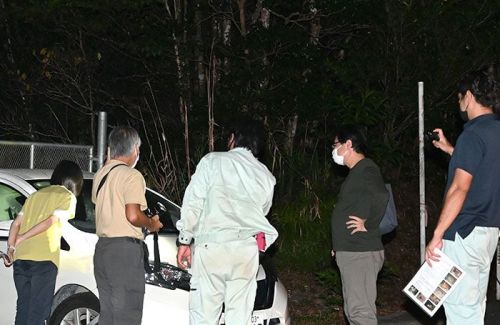Okinawa Prefecture and the Ministry of the Environment patrol Yambaru forest to stop poaching

Patrollers investigating a parked car alongside a service road in Yambaru forest – September 23, Okinawa’s northern region
September 24, 2021 Ryukyu Shimpo
Okinawa Prefecture and the Ministry of the Environment engaged in joint patrols of Yambaru forest on September 22 and 23 to prevent future poaching and theft of the rare and valuable wildlife species that live in the northern region of Okinawa’s main island, which became a World Natural Heritage Site in July. No poachers were found during this patrol, but the participants surveyed Yambaru forest with a wary eye on the lookout for suspicious people and cars.
In addition to the prefecture and the Ministry of the Environment, the patrol was joined by Nago police and the Kunigami Forest Association for a total of 14 people. From late at night on September 22 through the daybreak on September 23, the patrollers split into 4 cars and took two different routes, patrolling the forest roads taking care to watch out for rare wildlife. At one point they found a rental car stopped along a service road, and while it had a permit to travel through the forest, just to be sure the patrollers left a flyer calling to stop poaching under the car’s windshield wipers.
Hunting the precious wildlife in Yambaru is outlawed by various conservation laws. While patrolling, a number of animals listed in the appendices of the Convention on International Trade in Endangered Species of Wild Fauna and Flora (CITES, also called the Washington Convention), an international agreement to protect endemic species in places such as Japan’s southwestern archipelago, such as the Anderson’s crocodile newt, Amami woodcock, and Neolucanus beetle.
Naoki Shimabukuro, the head of Okinawa Environmental Protection Division’s World Natural Heritage Preservation and Promotion Office said, “We are making an etiquette book for Yanbaru, placing stations along the roads, and publishing a website. I hope it leads to people following the rules and being more informed.”
(English translation by T&CT and Sam Grieb)
Previous Article:ANA celebrates 60 years of service to Okinawa at Naha Airport
Next Article:Police dispatched to apprehend 700 kg. fighting bull, but have trouble moo-ving it back to its home
[Similar Articles]
- Protect the Yambaru Long-Armed Scarab Beetle: In three northern Okinawa villages, 30 people participate in patrol to prevent poaching
- Residents patrol Yambaru forest
- US base issues cast doubt on World Natural Heritage Site designation for Yambaru National Park woodlands
- Noguchigera released after road accident
- Habu-hunter Makishi opens a photo exhibit
 Webcam(Kokusai Street)
Webcam(Kokusai Street)


